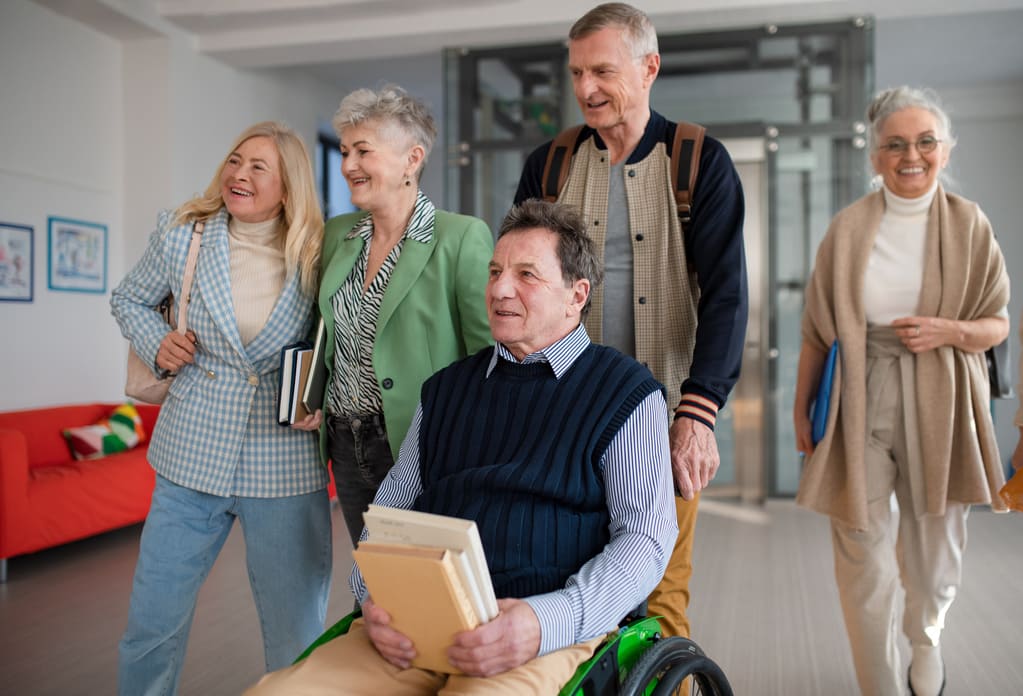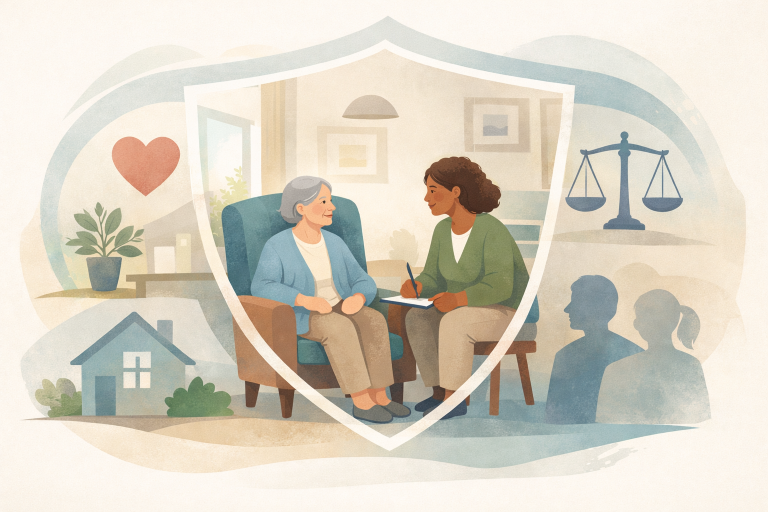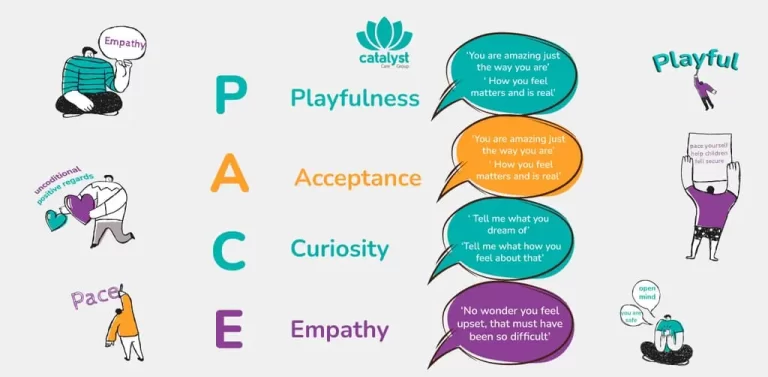Understanding people’s rights during hospital discharge is fundamental. Under the Mental Health Act (1983), a person can be detained in a mental health hospital if they put themselves or other people at risk. This includes institutionalising people without their consent. Following the act, this should only be a temporary solution until the person receives appropriate evaluation and treatment. However, it often results in prolonged and unnecessary hospital stays that can take months and even years.
Are people familiar with their human rights in discharge planning? Do social and health services consider people’s unique needs when creating discharge plans?
Understanding People’s Rights During Discharge
When the time comes to leave a hospital or care facility, it’s important for people to know their rights. This ensures they have the support they need and are treated with dignity and respect throughout the discharge process.
This is particularly important for people with a learning disability and autism. Due to a lack of a proper support services, many autistic children and adults, as well as people with a learning disability, experience difficulties in communicating their needs.
This is often misinterpreted as challenging behaviour and can pose a risk of unnecessary hospital admission or readmission. Additionally, due to a complex set of factors, like limited community services, the discharge process can be excessively delayed.
Everyone, including autistic people and people with a learning disability, has the right to a discharge plan that promotes their independence, providing clear information and tailored support to meet their needs. Protected by the Human Rights Act (1998) and Equality Act (2010), they are entitled to fair treatment, dignity, and access to essential services during and after discharge.
Key Human Rights to Uphold During Discharge
When discharge planning, it’s essential to uphold key human rights to ensure a smooth and safe hospital-to-community transition. Protecting dignity, promoting choice, and providing access to appropriate support are fundamental principles that guide every step, ensuring the process is person-centred and empowering.
Right to Informed Consent
The right to informed consent, rooted in the Human Rights Act, is fundamental when transitioning from hospital care to the community. This right ensures that no decisions about a person’s care are made without their full understanding and agreement, safeguarding their autonomy and dignity.
It emphasises the need for clear, respectful communication, where people are provided with all the necessary information about their care options, potential risks, and the impact on their day-to-day lives. Informed consent is not just a legal obligation but a recognition of each person’s right to make choices about their own life.
In the context of hospital discharge, a person must be actively involved in discussions about their care plan.
The process should be transparent, ensuring that they are not just informed but also encouraged to clearly express their preferences.
Upholding this right protects people from feeling powerless in decisions that affect their future, ensuring their voice is central in planning their transition back into the community.
Right to Privacy and Confidentiality
The right to privacy and confidentiality, as outlined in the Human Rights Act, is crucial in ensuring that personal information is protected, particularly during a person’s transition from hospital care back to the community.
This right guarantees that sensitive details about a person’s health, care needs, and personal circumstances are kept private and only shared with those directly involved in their care and with their consent.
It underscores the importance of treating people with respect and dignity, ensuring they feel secure in knowing their information is handled with care and discretion.
In the context of discharge, respecting privacy and confidentiality means that any discussions about a person’s care plan, medical history, or support needs are conducted in a way that protects their personal information.
Carers, families, and professionals must follow strict guidelines, ensuring the person has control over who knows their personal details. By upholding this right, the transition from hospital to community care remains dignified, where people feel their trust is valued and their privacy respected.

Right to Dignity and Respect
The right to dignity and respect is at the heart of ensuring that everyone is treated as a valued individual, particularly during sensitive times like transitioning from hospital care to the community.
This right means recognising each person’s worth, listening to their preferences, and ensuring they’re involved in decisions about their own care. It’s about more than just meeting basic needs—it’s about ensuring that people feel respected, heard, and supported throughout their care journey.
When someone leaves the hospital, upholding their dignity and respect means taking the time to understand their wishes and ensuring their care plan reflects who they are, not just their medical needs.
It’s about talking to people with kindness, respecting their choices, and ensuring the care is tailored to their unique circumstances. By protecting their right to dignity and respect, we empower people to feel confident and valued as they move forward in their recovery.
Right to Access Quality Healthcare Services
The right to access quality healthcare services ensures everyone receives the care they need, regardless of their background or circumstances.
This right means that healthcare should be timely, appropriate, and designed to meet a person’s specific needs, ensuring they have the best possible support throughout their health journey. It also emphasises that care should be delivered by skilled professionals in an environment that promotes well-being and safety.
When someone is transitioning from hospital to community care, their right to access quality healthcare services becomes especially important.
It ensures they receive ongoing support that matches the level of care they had in the hospital, whether through follow-up appointments, home care, or community services.
This right also means that people should not face unnecessary barriers or delays in getting the care they need, ensuring their journey toward recovery is as smooth and supported as possible.
The Role of Healthcare Providers in Protecting People’s Rights
Healthcare providers play a vital role in standing up for the rights of the people they support. This means truly respecting each person’s dignity and autonomy, allowing them to make informed choices about their care.
Providers work hard to ensure that everyone has access to the care they need, breaking down barriers that might get in the way. Advocacy is a big part of their role, as they speak out against injustices and collaborate with others to create positive change. Engaging in ongoing training, healthcare providers stay informed about human rights issues. In this way, they contribute to a healthcare system that truly values and protects the rights of all people.
This means seeing the person as a whole, with all their virtues, strengths and talents, not focusing on perceived limitations. It’s about having open conversations where questions are welcomed, and everyone feels heard. Further, it involves recognising each person’s worth, listening to their preferences, and ensuring they’re involved in decisions about their own care.
Maintaining confidentiality is essential for building trust and ensuring that personal information is kept safe and shared only when absolutely necessary. Additionally, being culturally competent allows providers to connect with people from diverse backgrounds, ensuring care is sensitive and tailored to individual needs.
By protecting people’s human rights, we encourage them to feel confident and valued as they move forward in their recovery.
Catalyst Care Group Advocating For Human Rights
As a dedicated health and social care provider, we are committed to advocating for human rights. This means treating each person with the utmost respect, dignity, and compassion they deserve.
We have created a Resource Network where commissioners, social workers, key workers and families have free access to condensed versions of the care acts. The goal is to help people stay informed on their rights and freedoms to live an independent and fulfilled life in the community.
Our approach goes beyond simply providing care; it involves genuinely listening, involving people in decisions about their care, and ensuring they have access to the information and services that are most important to them. By upholding these rights, we aim to make every person feel valued, heard, and empowered throughout their journey.
Advocating for human rights also involves protecting privacy, respecting informed consent, and offering care that meets each person’s unique needs. We strive to create an environment where trust is built through respect and genuine support, strengthening our connection with people and their families and ensuring they always feel safe and dignified.
Catalyst Care Group provides integrated care and support in the community in addition to our Community Transition Services.
If you need urgent care, long-term support or community transition support, we are here for you!













